It's June 1968 in Westwood Village, smack dab in the middle of Los Angeles and adjacent to the UCLA campus. You've decided to take a break from protesting against, I dunno, let's say racism to take in a movie - you know, the one everyone's talking about. The book it's based on only just came out last year, and the line to get in wound around the block. It's called Rosemary's Baby, and it starts out like a Doris Day comedy with attractive people in an attractive area of New York City having delightful domestic adventures. But, then the story turns. The lead girl is either losing her mind, succumbing to a diabolical dream, or she's truly encountering the devil himself. It's a piece of cinema so powerful in its depiction of paranoia and mental breakdown Hitchcock would be proud to call its own.
What a movie!
As you walk out, a tall, cigar-chomping man eagerly approaches you, quick to shake your hand. "Well, whadda'ya think of the picture?" he boasts like a salesman who thinks he just sold you cheap steaks when you clearly just had filet mignon.
"Hold on, is that William Castle, The Tingler guy?" you think. "What on Earth is he doing here?"
He's there because he produced the movie. The man who once put buzzers on the bottom of theater seats, rigged an inflatable skeleton to fly above the audience on a rail, and posted nurses in the lobby and an ambulance outside the marquee just made Rosemary's Baby, a film critics at the time hailed as the best thing the horror genre had ever seen.
Yeah, it was weird.
But, also, kind of endearing.
Here's how it happened:
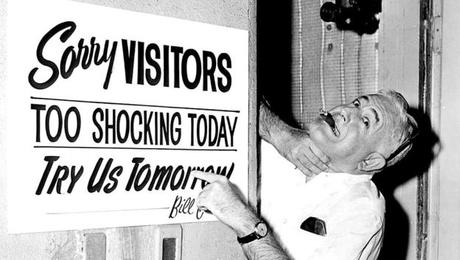
Caption: The real William Castle.
Even B-movie, schlockmeister pioneers want to go legit eventually, and Castle recognized his chance in Ira Levin's best-selling 1967 novel which Truman Capote called "a darkly brilliant tale of deviltry that induces the reader to believe the unbelievable." By that point, Castle had enjoyed a decade of notoriety, traveling the country, hosting his gimmick-dependent movies.
"I was ready to throw in the towel" - William Castle
But the gimmicks, as they always do in film history, eventually fell out of favor. The box office receipts dwindled. "My small empire was beginning to collapse and by 1967, I was ready to throw in the towel . . . Desperately I started to search for the miracle that would save my career. I had to find something, anything or I'd be out of the business. Then from heaven, the miracle appeared. Or was it from hell?" Castle recalled in his memoirs.

"Even if they ban it, the Catholics will go!" - Castle
That apparently questionable miracle was Rosemary's Baby, which was sent to him in galleys by his literary agent Marvin Birdt. The title didn't exactly grab him. "It's probably some story about an unwed mother... cheap exploitation. Who the hell wants to make a picture like that?" he later admitted thinking.
Three hours later, he'd finished the book entirely and completely changed his mind, "It was the greatest novel that would translate into a screenplay that I had ever read. That just lent itself to a brilliant movie. And I loved the property and I bought the property because I wanted to prove to the industry my fellow peers that I could do something really brilliant."
Before moving on it, though, he consulted with his wife Ellen for a second opinion. She shared his euphoric view of the text but warned the story was sure to cause problems with The Catholic Church. "Even if they ban it, the Catholics will go," he boasted.
He moved quickly to buy the film rights for $100,000, throwing in an additional fifty grand if the book became a bestseller. It meant mortgaging his house to find the money, and he would only later learn the publisher actually offered it to Alfred Hitchcock first.
"His eyes looked through mine and I felt he saw right through me." - Castle
The next step was to find a studio. For that, Castle made initial contact with Robert Evans at Paramount, where he was quickly kicked up to the studio chief Charlie Bluhdorn. A money-mongering millionaire, Bluhdorn chose to negotiate with him face-to-face, bypassing lawyers or middlemen. A formidable negotiator himself, Castle later conceded he'd met his match in Bluhdorn. "His eyes looked through mine and I felt he saw right through me." When Castle mentioned his desire to direct instead of simply producing the film, Bluhdorn laughed in his face, calling him a "big ridiculous clown."
Castle was this close to walking. In fact, he threatened to do exactly like that, promising, "If I walk through that door, Rosemary's Baby is finished at Paramount. No one -and I mean no one- will renegotiate!" They somehow managed to reach a compromise. The official deal they eventually struck gave Castle $250,000, 50% of the profits, and the opportunity to produce AND direct with one caveat: he had to meet with Roman Polanski first, the Euro arthouse director Bob Evans had pegged as the studio's preferred choice for Rosemary.
"That's why I'm here. Nobody will be able to direct it as well as Roman Polanski." - Polanski
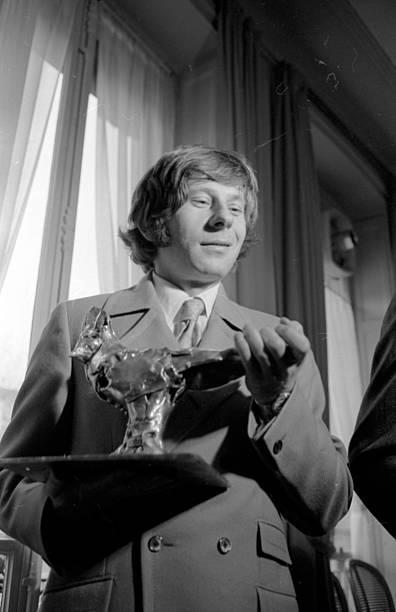
Castle had seen Polanski's Repulsion and Knife in the Water and was impressed enough to at least take a meeting with the up-and-comer, but he didn't mortgage his house to be replaced at this key stage. Polanski needed to blow him away. It didn't get off to a great start. As recounted in The Last Drive-In's deep dive, the early exchanges between the two went something like this:
I like it very much... It will make a great picture." Polanski spoke in his Polish accent. "You would like to direct Rosemary?" Bill asked. "That's why I'm here. Nobody will be able to direct it as well as Roman Polanski."
What, well, what a little arrogant prick, a common first response to anyone meeting Polanski at the time. But Polanski backed up that arrogance with conviction and undeniable talent. When Castle offered him a trick question about all the fancy camera movements he would likely use while making the movie, Polanski defiantly responded, "No, I don't Mr. Castle. Actors tell story... like peeping through the keyhole of life. I do not like crazy tricks with camera... must be honest."
That's actually exactly how Castle pictured making the movie. By the end of the meeting, Castle kind of liked this guy. The job was his.
It might never have been truly in doubt. As the film's eventual production designer Paul Sylbert later observed, " Rosemary's Baby was a big bestseller. They were set to have a movie that was as big as the book, and Bill was known as a schlock artist. It was bigger than anything Castle could handle. I mean, it just wasn't gonna happen."
If it had to be somebody else, Polanski would do. Yes, he was arrogant, a dictator on set, and worked at a snail's pace, at least compared to the "faster, cheaper" world of B-Movies Castle came from. But he was also damn good and seemed genuinely deferential to the book. So, Castle stepped aside and let the 35-year-old Frenchman (er, technically French-Polish) take the director's chair.
"I'm sure I could have done it" - Castle
That doesn't mean he liked it, though. As Sylbert recalled the old showman would eventually vent his frustration, "Bill was...hurt is not quite the right expression. He felt he'd been pushed aside and he was very frustrated. We were on the East side of New York where the doctor's office was, and we would walk around that building frequently because he had all this energy. He would go on about how he wanted to direct it, 'I'm sure I could have done it,' but he began to live with it."
Castle, of course, was singing a different tune in the media. Why wasn't he directing this picture? Oh, he simply didn't have time, not with all the other films he was making for Paramount, a list which included 1967's The Busy Body and The Spirit is Willing and 1968's Project X. That Polanski fella, though, a real pro. The exact quote: "Polanski is the greatest talent I've ever seen and an absolute perfectionist technically."
Polanski returned the kindness, "Castle never pretended to he was making masterpieces, but he's an excellent technician who understands filmmakers' problems and doesn't have the usual worries other producers have. He made a constant effort to make me happy in my work. I can't think of a better producer."
Polanski even gave Castle a cameo:
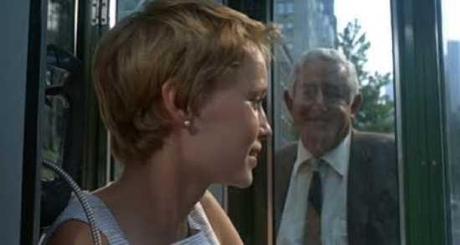
But old habits die hard and Castle always trended toward showmanship. So, when the time came for Mia Farrow to cut her hair into the film's iconic pixie cut Castle partnered with Vidal Sassoon for a publicity stunt. Vidal hairdressers set up a haircutting station on Paramount's Stage 13, and Castle made sure it was blocked off by velvet ropes and that there was a red carpet leading to it. Press and photographers were invited to watch from a set of bleachers. All just to see Mia Farrow's haircut.
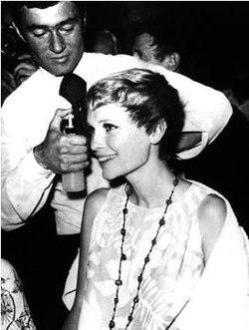
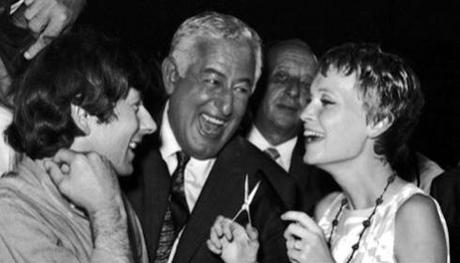
"If I do my job right, people will actually believe they've seen the baby." - Polanski
While Castle busied himself with such stunts, Polanski focused on finishing the film, which led to one of the biggest on-set disagreements: how do you make a movie called Rosemary's Baby and not show the baby?
This went against all of Castle's natural instincts. You don't promise devil baby in the title and not deliver. Polanski had his reasons, though, telling Castle, "Everyone will have his own personal image. If we show our version-no matter what we do-it'll spoil that illusion. If I do my job right, people will actually believe they've seen the baby."
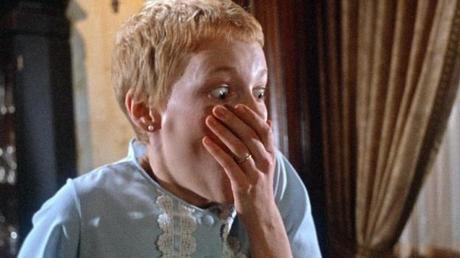
Polanski's intuition was, of course, correct, and Castle came around, later boasting, "When Rosemary was shown on TV, columnists reported that 'due to censorship,' ABC had cut the scenes where the 'baby' was shown. Rosemary's 'baby' was never photographed. The imagination plays tricks on you like that."
Once the film came out, it turned into the biggest hit in the horror genre since Psycho at the start of the decade, It was thus a breakthrough project for nearly everyone who made it. The star, Farrow, finally forced her way out from under Frank Sinatra's thumb, her famous, soon-to-be ex-husband. The studio suits, a group which included Robert "The Kids Stay in the Picture" Evans, leveraged the film's success into charting a newer, more artistically daring path for Paramount Pictures. The director, Polanski, broke out of making quirky, artsy European pictures and emerged well on his way to creating his masterpiece, Chinatown.
Castle, meanwhile, finally obtained his ever-elusive legitimacy. However, while he lived another 9 years and produced three more movies ( Riot, Shanks, Bug) while also acting in several others (including Shampoo) he never again tasted a success as artistically and financially rewarding as Rosemary's Baby.
Still, Rosemary's Baby kickstarted a horror revolution. Paul Sylbert argued, "It opened the door for class A productions of horror movies. The money spent on The Exorcist was pretty steep, but it paid off. Rosemary's Baby opened the door. It took it out of the schlock genre and put it up there with other successful movies."
All it took to make it happen was a schlock master like William Castle trying to go legit.
Source: Reel Terror, Films of the Golden Age, The Last Drive-In

